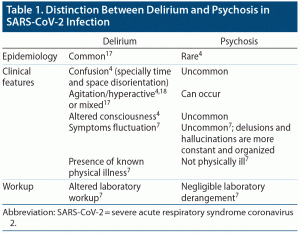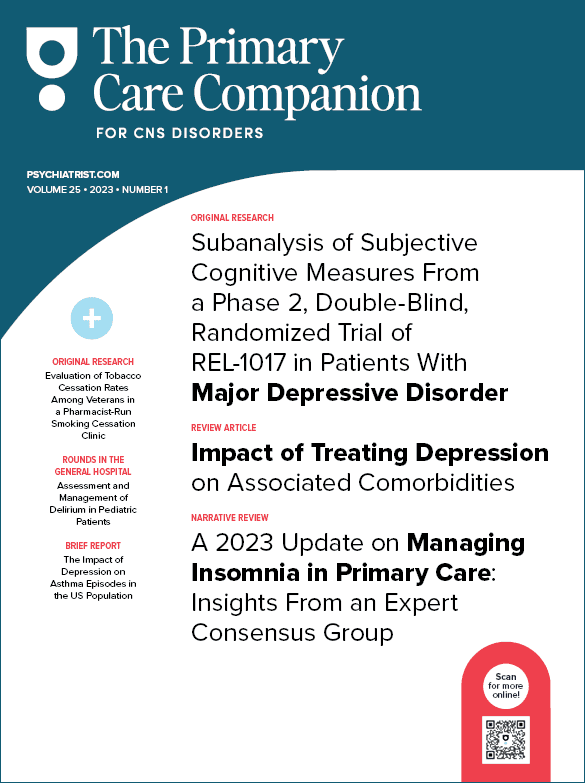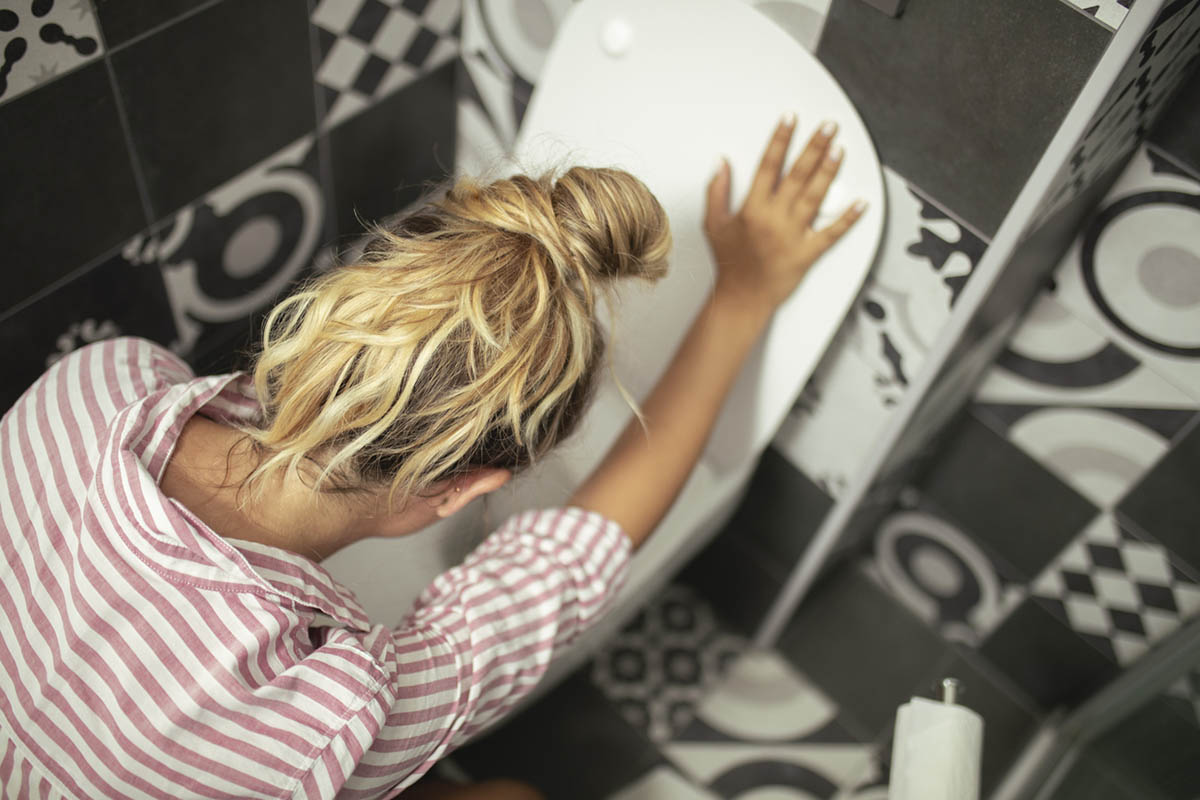
Prim Care Companion CNS Disord 2021;23(5):21cr03070
To cite: Santos NF, Alho AP, Costa ID, et al. First-episode psychosis with delusional jealousy during SARS-CoV-2 infection: COVID-19 secondary psychosis or a trigger for a primary psychotic disorder? Prim Care Companion CNS Disord. 2021;23(5):21cr03070.
To share: https://doi.org/10.4088/PCC.21cr03070
© Copyright 2021 Physicians Postgraduate Press, Inc.
aDepartment of Psychiatry and Mental Health, Hospital Distrital de Santarém, Santarém, Portugal
*Corresponding author: Núria F. Santos, MD, Department of Psychiatry and Mental Health, Hospital Distrital de Santarém, EPE, Avenida Bernardo Santareno 3737B, 2005-177 Santarém, Portugal ([email protected]).
Psychosis is a state primarily defined by the presence of delusions and hallucinations and is likely to have a multifactorial origin.1 Viral infections have been suggested as one of those etiologies.2,3 Coronavirus disease 2019 (COVID-19) is an infection caused by the severe acute respiratory syndrome coronavirus 2 (SARS-CoV-2) virus, which can trigger several neuropsychiatric symptoms.1,2,4 However, data about COVID-19–associated psychosis are currently limited.1–16 Here, we aim to present a case report of first-episode psychosis during SARS-CoV-2 infection.
Case Report
A 61-year-old man presented to the emergency department in November 2020 with cough, myalgias, and fever. The patient’s nasopharyngeal swab testing by RT-PCR (real-time polymerase chain reaction) was positive for SARS-CoV-2 infection. The symptoms fully remitted a week later.
A month after symptom remission, the patient was brought to the emergency department. He was convinced his spouse was being unfaithful, claiming he could hear her having erotic conversations with a person he could not identify in a set of audio recordings on his mobile phone. It was acknowledged that the patient’s delusional belief started 2 days before his COVID-19 symptoms presented. The patient had no significant personal or family psychiatric history. The objective examination showed no focal neurologic deficits or other relevant findings. On mental state examination, delusional jealousy was present and functional auditory hallucinations were identified. He showed lack of insight for his situation.
Internal medicine physicians evaluated the patient and ruled out emerging medical conditions. The RT-PCR remained positive for SARS-CoV-2 infection. Cranial computed tomography scan, full blood count, biochemical profile, urinalysis, serologic tests, thyroid function tests, drug tests, and vitamin levels were unremarkable.
First-episode psychosis was diagnosed, and the patient was voluntarily admitted to the psychiatry ward. The patient was started on risperidone 3 mg at night, which was progressively increased to 2 mg at breakfast and 3 mg at night, because it is recommended as first-line therapy in psychosis and displayed efficacy in other published COVID-19–associated psychotic disorders.9,10,14 Lorazepam 0.5 mg 3 times/d was prescribed for anxiety management. During the hospital stay, the delusion of jealousy was progressively less systematized, with less impact on humor and behavior, and the patient did not spontaneously mention it. He was discharged 15 days after admission under the aforementioned therapy.
The patient attended the scheduled psychiatry consultations; risperidone was progressively decreased and lorazepam was weaned off. Three months after discharge, the patient remained asymptomatic on risperidone 1 mg daily.
Discussion
Apparent COVID-19–associated psychosis cases have been reported, but establishing a causal relationship between SARS-CoV-2 infection and psychosis requires a considerable evidential threshold, which most studies failed to expose.3 Most cases report psychotic symptoms in delirium during the acute phase of SARS-CoV-2 infection3 (Table 1). In the present case, the patient remained conscious and fully orientated at all times, excluding delirium. Other studies report corticosteroid-induced psychosis,4 which were not prescribed to our patient.
Our case illustrates a challenging diagnosis that can represent an organic delusional disorder secondary to COVID-19 or a delusional disorder in which COVID-19 acted as a trigger for the psychotic disorder about to flourish. The coincidental presentation time points toward an organic delusional disorder secondary to COVID-19. This is the first case report, to our knowledge, of a primary psychotic episode with delusional jealousy during SARS-CoV-2 infection.
Limitations of this case report comprise investigations that were not carried out, such as lumbar puncture. Lumbar puncture could establish the etiology of the symptoms, but the medical team considered it pointless to perform an invasive procedure without impact on treatment or short-term outcome.
This case demonstrates the importance of awareness of the possibility of SARS-CoV-2 infection in patients with new-onset psychotic symptoms. Prospective research concerning psychiatric symptoms of patients infected with SARS-CoV-2 is mandatory.
Received: July 8, 2021.
Published online: September 30, 2021.
Potential conflicts of interest: Drs Santos and Sêco worked as investigators in the PsiProsper Study until March 2021. PsiProsper is a non‐Interventional study developed by Janssen Pharmaceuticals, Inc. Drs Alho, Costa, and Ferreira report no conflicts of interest related to the subject of this report.
Funding/support: None.
Patient consent and confidentiality: Consent was received from the patient to publish the report, and information has been de-identified to protect anonymity.
References (18)

- Tariku M, Hajure M. Available evidence and ongoing hypothesis on corona virus (COVID-19) and psychosis: is corona virus and psychosis related? a narrative review. Psychol Res Behav Manag. 2020;13:701–704. PubMed CrossRef
- Parra A, Juanes A, Losada CP, et al. Psychotic symptoms in COVID-19 patients: a retrospective descriptive study. Psychiatry Res. 2020;291:113254. PubMed CrossRef
- Watson CJ, Thomas RH, Solomon T, et al. COVID-19 and psychosis risk: real or delusional concern? Neurosci Lett. 2021;741:135491. PubMed CrossRef
- Rogers JP, Chesney E, Oliver D, et al. Psychiatric and neuropsychiatric presentations associated with severe coronavirus infections: a systematic review and meta-analysis with comparison to the COVID-19 pandemic. Lancet Psychiatry. 2020;7(7):611–627. PubMed CrossRef
- Jaworowski S, Weiser M, Gropp C, et al. Three cases of COVID-19–related first onset brief reactive psychosis. Isr Med Assoc J. 2020;22(10):612. PubMed
- Fischer M, Coogan AN, Faltraco F, et al. COVID-19 paranoia in a patient suffering from schizophrenic psychosis—a case report. Psychiatry Res. 2020;288:113001. PubMed CrossRef
- Ferrando SJ, Klepacz L, Lynch S, et al. COVID-19 psychosis: a potential new neuropsychiatric condition triggered by novel coronavirus infection and the inflammatory response? Psychosomatics. 2020;61(5):551–555. PubMed CrossRef
- Lanier CG, Lewis SA, Patel PD, et al. An unusual case of COVID-19 presenting as acute psychosis. J Pharm Pract. 2020;1-4:897190020977721. PubMed
- Chandra PS, Shiva L, Nagendrappa S, et al. COVID 19 related psychosis as an interface of fears, socio-cultural issues and vulnerability- case report of two women from India. Psychiatry Res. 2020;290:113136. PubMed CrossRef
- Lim ST, Janaway B, Costello H, et al. Persistent psychotic symptoms following COVID-19 infection. BJPsych Open. 2020;6(5):e105. PubMed CrossRef
- Brown E, Gray R, Lo Monaco S, et al. The potential impact of COVID-19 on psychosis: a rapid review of contemporary epidemic and pandemic research. Schizophr Res. 2020;222:79–87. PubMed CrossRef
- Valdés-Florido MJ, López-Díaz Á, Palermo-Zeballos FJ, et al. Reactive psychoses in the context of the COVID-19 pandemic: clinical perspectives from a case series. Rev Psiquiatr Salud Ment (Engl Ed). 2020;13(2):90–94. PubMed CrossRef
- Rentero D, Juanes A, Losada CP, et al. New-onset psychosis in COVID-19 pandemic: a case series in Madrid. Psychiatry Res. 2020;290:113097. PubMed CrossRef
- Smith CM, Komisar JR, Mourad A, et al. COVID-19-associated brief psychotic disorder. BMJ Case Rep. 2020;13(8):1–3. PubMed CrossRef
- Ng QX, Yeo WS, Lim DY, et al. Re-examining the association between COVID-19 and psychosis. Psychosomatics. 2020;61(6):853–855. PubMed CrossRef
- Mirza J, Ganguly A, Ostrovskaya A, et al. Command suicidal hallucination as initial presentation of coronavirus disease 2019 (COVID-19): a case report. Psychosomatics. 2020;61(5):561–564. PubMed CrossRef
- de Sousa Moreira JL, Barbosa SMB, Vieira JG, et al. The psychiatric and neuropsychiatric repercussions associated with severe infections of COVID-19 and other coronaviruses. Prog Neuropsychopharmacol Biol Psychiatry. 2021;106:110159. PubMed CrossRef
- Beach SR, Praschan NC, Hogan C, et al. Delirium in COVID-19: a case series and exploration of potential mechanisms for central nervous system involvement. Gen Hosp Psychiatry. 2020;65:47–53. PubMed CrossRef
Enjoy free PDF downloads as part of your membership!
Save
Cite
Advertisement
GAM ID: sidebar-top





